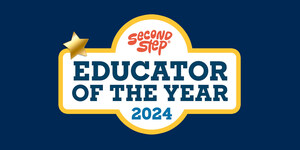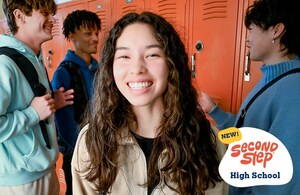Committee for Children Launches First-of-Its-Kind Digital Social-Emotional Learning Curriculum for Middle Schoolers
Designed to meet the real-world challenges faced by today's students and teachers
SEATTLE, Aug. 24, 2017 /PRNewswire-USNewswire/ -- Committee for Children, the global leader of research-based social-emotional learning curricula, recently announced the launch of the all-new Second Step Middle School Program. The program is a fresh take on social-emotional learning (SEL) for early adolescents and brings together today's technology with the latest research in SEL, the adolescent brain, and social psychology. It's a comprehensive, next-generation SEL program for middle schools.
"The new Second Step Middle School Program really reflects cutting-edge science and is designed to help students succeed socially, emotionally, and academically in school. We've put together a suite of lessons that tie together a lot of the most important research," said Brian Smith, PhD, Senior Research Scientist at Committee for Children.
Research shows that SEL provides major benefits in schools. The Collaborative for Academic, Social, and Emotional Learning (CASEL) and collaborating researchers have found that students from kindergarten through high school significantly benefit from school-based, universal SEL interventions. A meta-analysis, released in July of 2017, evaluated results for nearly 97,500 students in 82 schools, and the effects were assessed 6 months to 18 years after the program had ended. The study shows that 3.5 years after their last SEL intervention, students fared an average of 13 percentile points better academically than their peers in control groups, based on 8 studies that measure academics. Additionally, researchers saw a reduction in problem behaviors, emotional distress, and drug use for students with SEL exposure. The study also indicates that—regardless of race, socioeconomic background, or school location—students showed significant positive benefits one year post intervention. This finding suggests that SEL interventions can support the positive development of students from diverse family backgrounds or geographical contexts. In 2015, a pioneering report from Columbia University found that SEL interventions, including the Second Step Program, returned an average of $11 for every $1 spent.
Educators have been looking for a modern way to teach students necessary life skills—such as managing emotions, problem solving, and cooperating—using a method that doesn't overburden teachers and staff, is enjoyable for students, and gets results.
The all-new Second Step Middle School Program underwent two years of rigorous field testing in urban, suburban, public, private, and charter schools across the country to assess needs and determine how the fully redesigned curriculum worked in the classroom, and teacher preferences and strategies to engage middle schoolers have been incorporated throughout. The research-based program:
- Includes a full year of weekly 25-minute SEL lessons for Grades 6–8 (25–26 lessons per grade)
- Relies on student-driven discussion instead of lectures—students experience greater ownership of a curriculum that feels relevant, relatable, and practical in the context of their daily lives
- Is accessed via a web-based platform that makes it easy for educators to deliver content and keep track of program progress
- Is simple, intuitive, easy to use, and designed with the flexibility real classrooms need
- Provides professional learning and user tutorials—five modular professional learning experiences help bolster educators' social-emotional skills and offer strategies for encouraging SEL in the classroom
- Includes the tools needed to successfully implement the program schoolwide
- Includes all the materials to create a complete advisory program or fit an existing one
- Provides the tools and resources to extend and reinforce social-emotional skills beyond lesson time and in other academic areas
- Provides resources for engaging families
- Includes dedicated customer support
"That social component of middle school is everything. And if you can be on a level playing field . . . if you can manage your emotions, then you're going to learn at school . . . I am able to reach every learner in the room, and that's what I want to do," said middle school teacher Tracy Rathke.
Building Skills and Relationships
Weekly Second Step lessons are the backbone of the Middle School Program and foundational to building students' social-emotional skills. These lessons span four units:
- Mindsets and Goals: Topics include growth mindset, helping others, making mistakes, setting goals, and making plans.
- Values and Friendships (Values and Relationships in Grade 8): Topics include values and decisions, online values, making friends, positive and negative relationships, and coping with changing relationships.
- Thoughts, Emotions, and Decisions: Topics include the role of emotions, responding to anger, unhelpful thoughts, handling rejection, calming down, and dealing with anxiety.
- Serious Peer Conflicts: Topics include perspectives, jumping to conclusions, resolving serious conflicts, bullying, gender harassment, sexual harassment, and gratitude.
Building on this foundation, Second Step advisory activities help nurture the sense of school community and close-knit relationships necessary for students' success and well-being while reinforcing lesson concepts and giving students more opportunities to practice their social-emotional skills. There are four different advisory activity types, all of them designed to meet these goals:
- Weekly Check-Ins and Check-Outs
- Class Challenges
- Class Meetings
- Service-Learning Projects
Each activity is paired with and can help reinforce skills taught in a particular Second Step lesson, but each is also self-contained. Activities can be mixed and matched to build a custom advisory schedule that supports the themes most relevant to a particular group of students.
"This is the key to a successful experience in middle school, that you feel connected as a person to the kids around you, you feel connected to your teachers, you feel connected to the community. When that happens in middle school, kids are very successful academically," Committee for Children Executive Director Joan Cole Duffell said.
About the Second Step Program
The award-winning Second Step Program is instrumental in strengthening the social-emotional skills of kids around the world and helping them reach their full potential. Grounded in extensive research, the Second Step Program carries a reputation for results. Each year, more than 10.6 million elementary and middle school students in the United States learn a common social-emotional language—and educators across the country praise the program's ease of use and the speed at which they see improvements in the classroom. Learn more at SecondStep.org.
Connect with the Second Step Program on Facebook and Twitter.
About Committee for Children
Founded in 1978, Committee for Children is a global nonprofit dedicated to helping children everywhere thrive emotionally, socially, and academically. Committee for Children is the world's largest provider of research-based educational programs that promote social-emotional skills and prevent bullying and sexual abuse. Committee for Children works with educators, parents, policy makers, and partner organizations to deliver research-based programs, advocate for public policies, and provide leadership in the field. Today the organization's curricula reach schools in more than 70 countries, including 30% of all U.S. elementary schools. Learn more at cfchildren.org.
Connect with Committee for Children on Facebook and Twitter.
CONTACT: Shauna McBride, [email protected], 206.612.8718
SOURCE Committee for Children
Related Links
WANT YOUR COMPANY'S NEWS FEATURED ON PRNEWSWIRE.COM?
Newsrooms &
Influencers
Digital Media
Outlets
Journalists
Opted In






Share this article